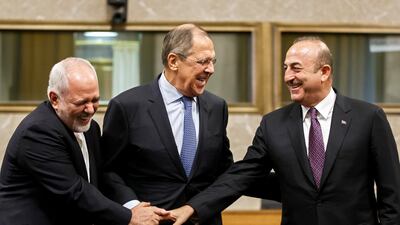“Our patience is not limitless,” said Turkey’s Recep Tayyip Erdogan this week, as uncertainty continues to loom over a proposed northern Syria safe zone. The 32-kilometre zone was mooted by Mr Erdogan last month, apparently as a way to appease US President Donald Trump a day after he threatened to “devastate” Turkey’s economy if the Kurds were attacked. But what might have superficially appeared to have been an olive branch from Ankara was in fact an unabashed attempt to remove Kurdish forces from its borders, at any cost.
Ankara sees the US-allied Kurdish YPG as a terrorist organisation. Its proposed safe zone follows a US-Turkey agreement last June that rebel fighters from the Syrian Democratic Forces, headed by the YPG, would withdraw from Manbij, which they have held since 2016. Although such a deal would protect them from Turkish assault, it was a bitter pill to swallow for rebel fighters who had helped drive out ISIS.
But with that promise still undelivered, and following Mr Trump’s decision to withdraw 2,000 US troops from Syria, the Turks are growing impatient. After a meeting in Washington of foreign ministers of the anti-ISIS coalition on Wednesday, Turkey’s Mevlut Cabusoglu said: “The road map should have been completed by now and the reason it hasn’t is the United States”. There is a danger that Ankara could continue to carve out a sphere of influence unimpeded, particularly as the US’s role in Syria is waning.
Ankara’s ambitions are both imperial and defensive. Certainly it has grounds for concern about the association between the YPG and the militant PKK organisation, which has carried out attacks on Turkish soil.
But Turkey’s desire to follow Russia and Iran in embedding itself in Syria is as much about control. “There is no satisfactory plan that is put before us concretely yet,” said Mr Erdogan on Tuesday, before threatening to implement his own. “No threat can make us turn from this path.” A Turkish-controlled buffer zone would put civilian lives at risk and would entrench Ankara within Syria’s borders.
The US has approached Australia, France and Britain about monitoring the safe zone; an international observation force would be preferable. If Ankara manages the buffer zone, the aspirations of Kurdish autonomy in northern Syria – much like Iraqi Kurdistan, which was born from a similar safe zone in 1991 – might acquiesce to the more atavistic desire for survival.
Mr Erdogan will meet Russian president Vladimir Putin next Thursday in Sochi, where Mr Putin will continue to pressurise his Turkish counterpart to restore relations with Damascus. As these powers draft the next chapter of the Syrian war, US influence on the ground is dissipating, taking with it the Kurds’ last line of defence. A safe zone is a positive step, but unless it is patrolled by a joint international force, it will only add to the upheaval Syria is facing.

